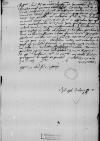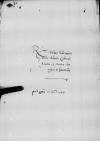List #1830
Ioannes DANTISCUS do Tiedemann GIESELöbau (Lubawa), 1538-01-14
Regest polski: Dantyszek nie ma nowych wiadomości, ale nie chciał, aby prepozyt [Paweł Płotowski] wyjechał bez listu. Johann von Werden powiadomił Dantyszka listownie, że w ciągu trzech dni przyjedzie do niego [do Lubawy] z Przezmarku; kiedy Dantyszek omówi z Werdenem sprawy wypłaty dotyczącej Szkarpawy, natychmiast pośle swego brata Georga [von Höfen (Flachsbinder)] do Gdańska na spotkanie z dziekanem [Leonard Niederhoff] w sprawach, o których sam niedawno rozmawiał w Lidzbarku z adresatem; po powrocie Georga Dantyszek wróci do Lidzbarka.
| odebrano 1538-01-17 Rękopiśmienne podstawy źródłowe:
Publikacje:
| ||||||
Tekst + aparat krytyczny + komentarzZwykły tekstTekst + komentarzTekst + aparat krytyczny
Reverendissimo Domino
Reverendissime Domine, frater et amice carissime et honorande.
Salutem fraternique amoris commendationem.
Tametsi nihil in praesenti scriptione dignum se offerat, nolui tamen sine meis venerabilem dominum
De novis penitus apud me nihil habetur. Quae in
Cui aetatem diutissime prosperam et opto, et precor.
Reverendissimae Dominationis Vestrae frater integerrimus
[1 ] Based on the agreement of 1530-08-16 the Gdańsk authorities repurchased Scharpau from the diocese of Ermland for 15000 small grzywna. The first part of this amount (7000 small grzywna) was paid to Bishop Mauritius Ferber, and the rest of it to his successors (cf. cf. Teresa Borawska, Tiedemann Giese (1480-1550) w życiu wewnętrznym Warmii i Prus Królewskich, Olsztyn, 1984 ⌊BORAWSKA 1984cf. Teresa Borawska, Tiedemann Giese (1480-1550) w życiu wewnętrznym Warmii i Prus Królewskich, Olsztyn, 1984 ⌋, p. 185)

